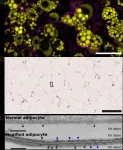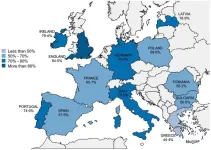(Press-News.org) Washington DC, November 28, 2024: The global food system is uniquely vulnerable to climate impacts, making adaptation of paramount importance. While contributing roughly one-third of total anthropogenic emissions, food systems around the world fortunately also hold immense potential for mitigation through improved practices and land use. A new article published today in Science emphasizes the critical role of agrifood value chains (AVCs) in supporting both adaptation and mitigation at the farm level.
Authored by Johan Swinnen (International Food Policy Research Institute), Loraine Ronchi (World Bank Group), and Thomas Reardon (Michigan State University and IFPRI), the paper pushes back against pessimism that agriculture cannot play an effective role in climate change mitigation and adaptation because of its fragmented nature. Structures and incentives within AVCs can effectively empower farmers to adopt climate-smart agricultural practices more widely. As such, AVCs have an important role to play in realizing the UAE Declaration on Sustainable Agriculture from COP28, signed by some 160 nations committed to integrating agriculture into climate strategies.
Unlocking the Potential of Agrifood Value Chains
AVCs, which link input providers (e.g., of seeds, fertilizers) to downstream entities (e.g., processors, retailers), represent a powerful mechanism for advancing climate-smart agriculture. These chains capture most of the food system’s economic value, both in OECD countries and the rapidly transforming Global South.
“AVCs can drive farmers’ adoption of climate-smart practices through tools like resource provision contracts, technology transfer, and financial incentives,” says Johan Swinnen. “Historically, these mechanisms have been used to enhance food quality and safety, suggesting their applicability for addressing climate goals.”
Despite this potential, much of the effort on climate mitigation and adaptation to date has focused narrowly on large multinational firms and certification schemes for export markets. “Micro, small, and medium enterprises (MSMEs), which make up 80–90% of AVC companies in the Global South, have a vital role to play,” states Thomas Reardon, “and can unleash grassroots transformation by providing small farmers with essential inputs, training, credit, and logistics in support of climate-smart agriculture.”
The Role of Science and Innovation
The article emphasizes the importance of science and innovation in harnessing the power of AVCs in promoting climate-smart agriculture at the farm level. The authors emphasize that there is a role for economic and social science, as well as for engineering and digital sciences to help AVCs send effective climate practice signals to farmers. Public and private R&D must prioritize accessible and affordable technologies such as climate-resilient seeds, methane-reducing animal feed, and efficient irrigation systems. Collaborative initiatives, such as those between research institutions and AVC firms in the dairy sector, exemplify how science can simultaneously reduce farm-level emissions and boost productivity.
Policy Solutions for Inclusive Climate Action
The authors also highlight the crucial role of policy frameworks in strengthening the vital role AVCs. They propose a range of policy measures, including:
De-risking private investments through public procurement programs and the redirection of agricultural subsidies toward sustainable initiatives.
Enabling private sector investment in the sector and business-friendly investments in transport, energy and communications networks.
Regulating emissions reporting within supply chains while helping smaller enterprises with compliance costs to ensure inclusiveness.
Addressing power imbalances in AVCs to promote fair income distribution and foster competition.
“Agrifood value chains represent a significant, but still largely untapped opportunity to drive climate-smart agriculture and build sustainable food systems,” states Loraine Ronchi, “given that processing and retail operations in AVCs share an interest in supply assurance and continuity, they are natural champions for supporting climate-smart, resource-wise approaches from their primary suppliers, who are farmers. Robust scientific effort on affordable technologies for smallholders, effective policy design, and inclusive stakeholder collaboration can support this.”
###
About the authors:
Johan Swinnen is Director General of the International Food Policy Research Institute (IFPRI). Loraine Ronchi is Global lead for Science, Knowledge and Innovation in Agriculture and Food, World Bank Group. Thomas Reardon (corresponding author) is a University Distinguished Professor, Department of Agricultural, Food, and Resource Economics, at Michigan State University and a Non-Resident Research Fellow at IFPRI.
The International Food Policy Research Institute (IFPRI) provides research-based policy solutions to sustainably reduce poverty and end hunger and malnutrition. IFPRI’s strategic research aims to identify and analyze alternative international and country-led strategies and policies for meeting food and nutrition needs in low- and middle-income countries, with particular emphasis on poor and vulnerable groups in those countries, gender equity, and sustainability. It is a research center of CGIAR, a worldwide partnership engaged in agricultural research for development. www.ifpri.org
END
New paper calls for harnessing agrifood value chains to help farmers be climate-smart
2024-11-28
ELSE PRESS RELEASES FROM THIS DATE:
Preschool education: A key to supporting allophone children
2024-11-28
Learning French while also developing language skills in one’s mother tongue is no easy task. As a result, allophone children often face learning and communication difficulties in kindergarten, which can negatively impact their educational journey. However, solutions are emerging.
According to a study led by Sylvana Côté, preschool education services significantly help bridge the gap between children whose mother tongue is French and those for whom French is a second or even a third language.
Professor Côté, from the School of Public Health at the Université de Montréal (ESPUM), is the director of the Observatory ...
CNIC scientists discover a key mechanism in fat cells that protects the body against energetic excess
2024-11-28
A team at the Centro Nacional de Investigaciones Cardiovasculares (CNIC), led by Professor Miguel Ángel del Pozo Barriuso, who heads the Mechanoadaptation and Caveolae Biology group at the CNIC, has identified an essential mechanism in fat cells (adipocytes) that enables them to enlarge safely to store energy. This process avoids tissue damage and protects the body from the toxic effects of accumulating fat molecules (lipids) in inappropriate places. The results, published in Nature Communications, signify a major advance in the understanding of metabolic diseases. Moreover, this discovery ...
Chemical replacement of TNT explosive more harmful to plants, study shows
2024-11-28
The increased use of a chemical compound to replace TNT in explosive devices has a damaging and long lasting effect on plants, new research has shown.
In recent years, TNT has started to be replaced with DNAN, but until now very little was known about how this substance impacts the environment and how long it can remain in the soil.
Researchers at the University of York have been studying the environmental impact of the explosive, TNT, for more than a decade. They have shown that the chemical compound, which is used by the military around the world, remains in ...
Scientists reveal possible role of iron sulfides in creating life in terrestrial hot springs
2024-11-28
An international team of scientists recently published a study highlighting the potential role of iron sulfides in the formation of life in early Earth’s terrestrial hot springs. According to the researchers, the sulfides may have catalyzed the reduction of gaseous carbon dioxide into prebiotic organic molecules via nonenzymatic pathways.
This work, which appeared in Nature Communications, offers new insights into Earth’s early carbon cycles and prebiotic chemical reactions, underscoring the significance of iron sulfides in supporting the terrestrial hot ...
Hormone therapy affects the metabolic health of transgender individuals
2024-11-28
New research from Karolinska Institutet shows that long-term sex hormone treatment in transgender individuals can lead to significant changes in body composition and risk factors for cardiovascular disease, particularly in transgender men. The study is published in the Journal of Internal Medicine.
“We saw that transgender men treated with testosterone increased their muscle volume by an average of 21 percent over six years, but also that the amount of abdominal fat increased by 70 percent,” says Tommy Lundberg, docent at the Department of Laboratory Medicine, Karolinska Institutet. “In addition, they had more liver ...
Survey of 12 European countries reveals the best and worst for smoke-free homes
2024-11-28
Seven out of ten homes in Europe are smoke-free, according to a major survey published today (Thursday) in ERJ Open Research [1]. However, some countries have come further than others in protecting children and adults from second-hand tobacco smoke in the home.
Greece came out bottom of the 12 countries in the survey, with smoking allowed in more than half of homes. In Romania, Bulgaria and Spain more than four in ten homes allow smoking to take place. England scored the highest out of the 12, with more than eight in ten homes smoke-free, with Ireland, Latvia and Italy following next.
The researchers say that the ...
First new treatment for asthma attacks in 50 years
2024-11-28
An injection given during some asthma and COPD attacks is more effective than the current treatment of steroid tablets, reducing the need for further treatment by 30%.
The findings, published today in The Lancet Respiratory Medicine, could be “game-changing” for millions of people with asthma and COPD around the world, scientists say.
Asthma attacks and COPD flare-ups (also called exacerbations) can be deadly. Every day in the UK four people with asthma and 85 people with COPD will tragically die. Both conditions are also very common, in the UK someone has an asthma attack every ...
Certain HRT tablets linked to increased heart disease and blood clot risk
2024-11-28
Certain hormone replacement therapy (HRT) tablets containing both oestrogen and progestogen are associated with a higher risk of heart disease and rare but serious blood clots known as venous thromboembolism (VTE) in women around the age of menopause, finds a study from Sweden published by The BMJ today.
Another HRT tablet called tibolone was associated with an increased risk of heart disease, heart attack and stroke, but not blood clots, “highlighting the diverse effects of different hormone combinations and administration methods on the risk of cardiovascular disease,” say the researchers.
HRT is used to relieve menopausal ...
Talking therapy and rehabilitation probably improve long covid symptoms, but effects modest
2024-11-28
Cognitive behavioural therapy (CBT) and a programme of physical and mental rehabilitation probably improve symptoms of long covid, but the effects are modest, finds a review of the latest evidence published by The BMJ today.
Intermittent aerobic exercise also probably improves physical function compared with continuous aerobic exercise. But the researchers found no compelling evidence to support the effectiveness of other interventions, including certain drugs, dietary supplements, inspiratory muscle training, transcranial ...
Ban medical research with links to the fossil fuel industry, say experts
2024-11-28
An investigation published by The BMJ today reveals the extent of fossil fuel industry involvement in medical research, leading to fresh calls for academics and publishing companies to cut ties with companies.
An analysis by journalists Hristio Boytchev, Natalie Widmann and Simon Wörpel found that over the past six years, more than 180 medical articles have acknowledged fossil fuel industry funding, and an additional 1000 articles feature authors who worked for a fossil fuel company or related organisation.
While many studies don’t have an obvious link with fossil fuel industry interests, experts told The BMJ that publishing research ...


